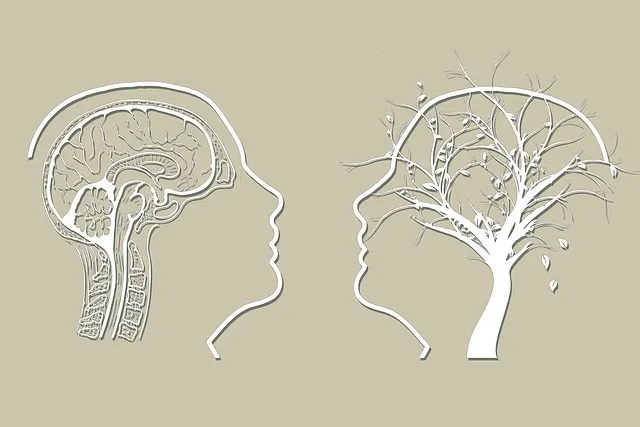Arvada Kaiser Permanente goes beyond treating mental health issues by focusing on developing Emotional Intelligence (EI) through their Mental Wellness Podcast Series, emphasizing EI's role in preventing conditions like depression and anxiety. The podcasts offer practical tools for emotion regulation, mindfulness, and coping mechanisms, aligning with the growing understanding of EI's benefits. Arvada Kaiser Permanente's mental health coverage includes resources for enhancing empathy, self-awareness, and effective communication, key components of emotional intelligence, through journaling, listening skills, cultural sensitivity training, and positive thinking exercises.
Emotional intelligence (EQ) is a powerful tool for enhancing overall well-being, as recognized by Arvada Kaiser Permanente’s mental health coverage initiatives. This article explores the significance of EQ development through various lenses. We’ll guide you through understanding EQ, its impact on mental health, and practical strategies to identify and manage emotions effectively. Learn how cultivating empathy and honing communication skills can foster deeper connections, ultimately transforming personal and professional interactions, all backed by Arvada Kaiser Permanente’s commitment to mental wellness.
- Understanding Emotional Intelligence: The Arvada Kaiser Permanente Mental Health Coverage Perspective
- Why Building Emotional Intelligence Matters for Overall Well-being
- Identifying and Managing Emotions: A Step-by-Step Guide
- Enhancing Empathy: Connecting with Others on a Deeper Level
- Strategies for Effective Communication: Unlocking the Power of Words
Understanding Emotional Intelligence: The Arvada Kaiser Permanente Mental Health Coverage Perspective

Emotional intelligence (EI) is a key component in personal and professional success, and Arvada Kaiser Permanente’s mental health coverage recognizes its importance. This perspective prioritizes not just treating mental health issues, but also empowering individuals to understand and manage their emotions effectively. By promoting EI development, Arvada Kaiser Permanente aims to prevent conditions like depression and anxiety, which can be exacerbated by a lack of emotional awareness and regulation.
The Mental Wellness Podcast Series Production offered by Arvada Kaiser Permanente serves as a practical approach to boost confidence and enhance emotional intelligence. These podcasts provide valuable insights and strategies for navigating various aspects of mental wellness. They offer coping mechanisms, mindfulness techniques, and communication skills that can significantly contribute to an individual’s overall well-being. This proactive approach aligns with the growing understanding that emotional intelligence is not just about empathy or sympathy; it’s a powerful tool for enhancing our relationships, making better decisions, and fostering a resilient mindset, ultimately leading to improved mental health outcomes.
Why Building Emotional Intelligence Matters for Overall Well-being

Building emotional intelligence (EQ) is a cornerstone for achieving and maintaining overall well-being. It empowers individuals to recognize, understand, and manage their own emotions, as well as empathize with and navigate the feelings of others. This capability is vital in fostering strong relationships, improving communication, and enhancing problem-solving skills. For instance, high EQ individuals are more adept at managing stress, which is a significant aspect covered under Arvada Kaiser Permanente mental health coverage, promoting better mental wellness.
Moreover, emotional intelligence plays a pivotal role in mitigating the impact of mental illness stigma reduction efforts. By developing EQ, people can challenge stereotypes and show greater compassion towards others struggling with mental health issues. This not only contributes to a more inclusive society but also encourages individuals to seek support without fear of judgment. Stress reduction methods often benefit from high EQ as well, as emotionally intelligent people are better equipped to handle challenging situations calmly and effectively.
Identifying and Managing Emotions: A Step-by-Step Guide

Identifying and managing emotions is a crucial aspect of building emotional intelligence (EI). The first step involves becoming more aware of your feelings. This means actively recognizing when you’re experiencing specific emotions, be it joy, anger, or sadness. Start by taking a moment to pause and reflect. Ask yourself: What am I feeling right now? Why do I feel this way? Understanding the source of your emotions is key to managing them effectively.
Once you’ve identified your emotions, it’s time to process them healthily. This can involve various techniques from promoting emotional well-being, such as engaging in activities that help calm your mind and body, like deep breathing exercises or mindfulness meditation. Additionally, applying mind over matter principles can be powerful; reframing negative thoughts and focusing on positive ones can change the way you feel. If emotions become overwhelming, consider using conflict resolution techniques to address them constructively, ensuring better mental health coverage under Arvada Kaiser Permanente plans.
Enhancing Empathy: Connecting with Others on a Deeper Level

Empathy is a cornerstone of emotional intelligence and plays a vital role in our interactions with others. At Arvada Kaiser Permanente, mental health coverage includes resources that support individuals in cultivating deeper levels of empathy. Through mental wellness journaling exercises, guidance on active listening, and awareness of cultural sensitivity in mental healthcare practice, people can develop the capacity to understand and share the feelings of another. This involves not just hearing what someone is saying but truly comprehending their emotional state and perspective.
By engaging in regular journaling practices, individuals can reflect on their experiences and emotions, fostering self-awareness that is essential for empathy. Social skills training also contributes to enhanced empathy by teaching effective communication techniques that help people connect with others on a deeper level. These practices, combined with the support of mental health professionals who prioritize cultural sensitivity, create an environment where empathy can flourish—a key aspect of building strong relationships and fostering a supportive community.
Strategies for Effective Communication: Unlocking the Power of Words

Effective communication is a cornerstone of emotional intelligence, and it starts with recognizing the power of words. At Arvada Kaiser Permanente mental health coverage, we emphasize the importance of choosing words wisely to foster understanding and connection. Positive thinking plays a crucial role here; expressing thoughts in a constructive manner can defuse conflicts and promote healthier interactions.
By focusing on self-esteem improvement and resilience building, individuals learn to articulate their feelings and needs assertively without becoming defensive or aggressive. This not only strengthens personal relationships but also enhances overall well-being. When words are used intentionally, they become tools for empathy, encouragement, and problem-solving—key components of emotional intelligence that can be nurtured and developed over time.
Building emotional intelligence is a transformative journey that, with dedication and the right tools, everyone can embark on. By understanding the foundational principles outlined in this article—from identifying emotions to enhancing empathy and effective communication—individuals can significantly improve their Arvada Kaiser Permanente mental health coverage. These strategies not only foster overall well-being but also strengthen relationships and create a more fulfilling life. Remember that emotional intelligence is a muscle that grows with consistent practice, making every step towards development a valuable investment in your future.






